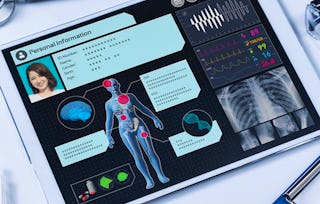This course will introduce MIMIC-III, which is the largest publicly Electronic Health Record (EHR) database available to benchmark machine learning algorithms. In particular, you will learn about the design of this relational database, what tools are available to query, extract and visualise descriptive analytics.

Ends soon: Gain next-level skills with Coursera Plus for $199 (regularly $399). Save now.

Data mining of Clinical Databases - CDSS 1
This course is part of Informed Clinical Decision Making using Deep Learning Specialization

Instructor: Fani Deligianni
3,463 already enrolled
Included with
(14 reviews)
Recommended experience
What you'll learn
Understand the Schema of publicly available EHR databases (MIMIC-III)
Recognise the International Classification of Diseases (ICD) use
Extract and visualise descriptive statistics from clinical databases
Understand and extract key clinical outcomes such as mortality and stay of length
Skills you'll gain
- Relational Databases
- Database Design
- Data Mining
- SQL
- Descriptive Statistics
- Interoperability
- Predictive Modeling
- Clinical Data Management
- Predictive Analytics
- Clinical Informatics
- Patient Flow
- Descriptive Analytics
- Medical Records
- Health Informatics
- ICD Coding (ICD-9/ICD-10)
- Precision Medicine
- Analytics
- Exploratory Data Analysis
- Machine Learning
- Electronic Medical Record
Details to know

Add to your LinkedIn profile
5 assignments
See how employees at top companies are mastering in-demand skills

Build your subject-matter expertise
- Learn new concepts from industry experts
- Gain a foundational understanding of a subject or tool
- Develop job-relevant skills with hands-on projects
- Earn a shareable career certificate

There are 4 modules in this course
This module will introduce MIMIC-III, which is the largest publicly Electronic Health Record (EHR) database available to benchmark machine learning algorithms. In particular, you will learn about the design of this relational database, what tools are available to query, extract and visualise descriptive analytics. The schema and International Classification of Diseases coding is important to understand how to map research questions to data and how to extract key clinical outcomes in order to develop clinically useful machine learning algorithms.
What's included
6 videos9 readings1 assignment2 discussion prompts
This week includes a discussion of the basic structure of MIMIC III database and practical exercises on how to extract and visualise summary statistics. We will understand the difficulty in defining clinical outcomes and we are going to examine clinical variables related to a specific patient.
What's included
5 videos7 readings1 assignment1 discussion prompt
This week discusses the history of the International Classification of Diseases (ICD) system, which has been developed collaboratively so that the medical terms and information in death certificates can be grouped together for statistical purposes. Practical examples shows how to extract ICD-9 codes from MIMIC III database and visualise them. Furthermore, we discuss differences between ICD-9, ICD-10 and ICD-11 systems.
What's included
5 videos6 readings1 assignment1 discussion prompt
This week includes an overview of clinical concepts, which are statistical tools to provide illness scores. They are developed based on expert opinion and subsequently extended based on data-driven methods. These models are the precursor of machine learning models for precision medicine. Finally, the practical exercises of this week provides the opportunity to implement a complex flowchart of patients inclusion.
What's included
3 videos11 readings2 assignments1 discussion prompt
Earn a career certificate
Add this credential to your LinkedIn profile, resume, or CV. Share it on social media and in your performance review.
Instructor

Offered by
Explore more from Machine Learning
 Status: Free Trial
Status: Free TrialUniversity of Glasgow
 Status: Preview
Status: PreviewNortheastern University
 Status: Free Trial
Status: Free TrialStanford University
 Status: Preview
Status: PreviewNortheastern University
Why people choose Coursera for their career




Learner reviews
14 reviews
- 5 stars
85.71%
- 4 stars
0%
- 3 stars
7.14%
- 2 stars
0%
- 1 star
7.14%
Showing 3 of 14
Reviewed on Jul 19, 2023
This is a great learning curve to properly introduce me into data analysis, and machine learning in healthcare data
Reviewed on Aug 2, 2022
This course is highly informative and practical-oriented. It has increased my desire in the clinical data analytics field

Open new doors with Coursera Plus
Unlimited access to 10,000+ world-class courses, hands-on projects, and job-ready certificate programs - all included in your subscription
Advance your career with an online degree
Earn a degree from world-class universities - 100% online
Join over 3,400 global companies that choose Coursera for Business
Upskill your employees to excel in the digital economy
Frequently asked questions
To access the course materials, assignments and to earn a Certificate, you will need to purchase the Certificate experience when you enroll in a course. You can try a Free Trial instead, or apply for Financial Aid. The course may offer 'Full Course, No Certificate' instead. This option lets you see all course materials, submit required assessments, and get a final grade. This also means that you will not be able to purchase a Certificate experience.
When you enroll in the course, you get access to all of the courses in the Specialization, and you earn a certificate when you complete the work. Your electronic Certificate will be added to your Accomplishments page - from there, you can print your Certificate or add it to your LinkedIn profile.
Yes. In select learning programs, you can apply for financial aid or a scholarship if you can’t afford the enrollment fee. If fin aid or scholarship is available for your learning program selection, you’ll find a link to apply on the description page.
More questions
Financial aid available,

